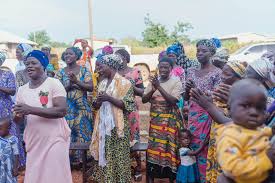By Samuel SAM
The Gulf of Guinea Northern Regions Social Cohesion Project (SOCO) to improve regional collaboration and socio-economic and climate resilience of border-zone communities, earmarked for the Northern Region, has led to the implementation of 58 projects.
48 out of the 58 projects have been fully completed and ready to be handed over to the beneficiaries, while the rest are about 85 percent complete. The projects include roads, classrooms, markets, health facilities and water systems that not only provide essential services, but also serve as hubs for local employment to benefit more than 2,500 groups.
With US$450million credit facility from the International Development Association/International Bank for Reconstruction and Development of the World Bank Group toward the implementation of the project, US$150million was allocated to Ghana.
The project covers the northern parts of Ghana, Benin, Côte d’Ivoire and Togo. In Ghana, the Ministry of Local Government, Decentralisation and Rural Development will lead the implementation of the project in forty-eight (48) Metropolitan, Municipal and District Assemblies (MMDAs) located in six regions; namely: Northern, North East, Upper East, Upper West, Savannah and Oti Regions.
It is expected to deliver resilient community infrastructure and assets through a Community-Driven Development approach (CDD) to be implemented over a period of five (5) years.
The project, inaugurated by the Vice President Dr. Mahmud Bawumia in October 2023, aimed at contributing to the prevention of conflict spillover from the Sahelian countries by improving the social and economic resilience of the targeted countries.
Beneficiaries are Tamale Metro; Sagnarigu, Karaga ,Gushegu ,Nanumba-North and Yendi Municipalities; as well as Saboba and Tatale Districts respectively.
Northern Regional Minister Alhaji Shani Alhassan Shaibu, speaking to the media, noted that the project is to drive employment and the economic levels in the areas as well build the capacity of the various contractors, the youth, skilled and unskilled labour.
He advocated for the expansion of the project to other eight districts in the region because of the enormous benefits that are coming from the project’s implementation.
“With the benefit of the project meant for a section of the districts, it is worrying; as the other eight districts that are not beneficiaries also lack infrastructure development. Therefore, there is a need to extend to other districts,” he said.
Capacity-Building Specialist Alhassan Osman said the aim of the project is to bridge the economic and social gaps between the southern and the sorthern sector.
“The project is of five components, with component one focusing on enhancing the resilience of the communities by providing social services, economic services and also conducting youth engagement activities that are intended to promote social cohesion while the other components focused on capacity building, regional coordination that involve all countries, project management and a contingency component; where in the event of a contingency or a crisis such as COVID, funds can be redirected to,” he said.
With the first component, 434 community facilitators have been engaged to be responsible for sensitisation and mobilisation activities; and 4,015 community project implementation committees have been set to ensure the achievement of the project, he explained.
He stressed that each facility is fully furnished to commence operations whenever they are inaugurated to help the communities.
Northern Zonal Coordinator of the SOCO project, Samuel Forson, said eight districts in the region are benefitting from the project to improve livelihoods, quality healthcare, education and other social interventions.
He noted that the press briefing was to account for the progress of the project within a year as well as show 2024/25 plans to the media and the public.










